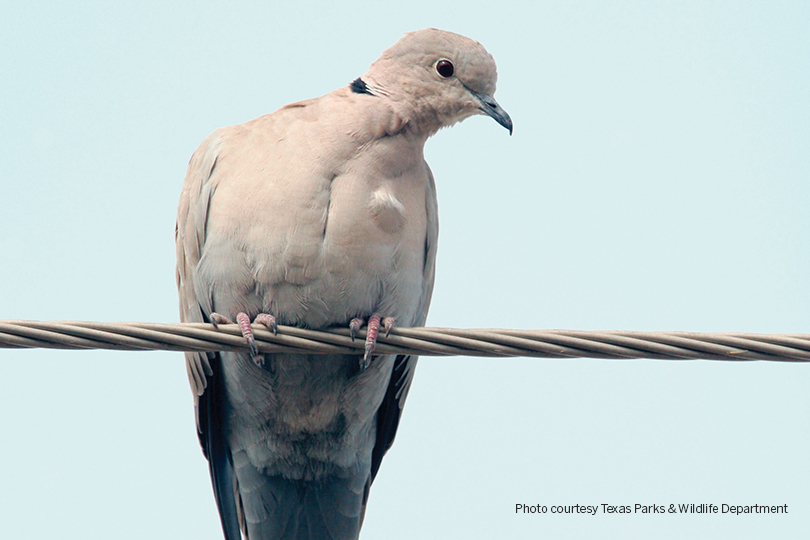By Jennifer Whitlock
Field Editor
The results are in from the Texas Dove Hunters’ Association’s (TDHA) annual Texas Banded Bird Challenge (TBBC).
This year, TDHA banded 800 Eurasian collared-doves, released them and asked hunters to notify TDHA if they harvested one. The bands are part of a research project, now in its third year, to learn more about the doves’ migration patterns and habitat preferences.
The data will hopefully provide insight into whether this invasive species is having a negative impact on native game birds and their habitat, said Bobby Thornton, TDHA co-founder.
“Our primary goal is to receive an increased percentage of return on the birds that are harvested. The [Texas] Parks and Wildlife Department does a tremendous job administering the federal program for mourning dove and white-winged dove, but they don’t have the resources to put toward the Eurasian collared-dove. We took that on, and we’re doing the best we can to help out,” Thornton said in an interview with the Texas Farm Bureau Radio Network. “That being said, it was a successful year.
The challenge was successful this year.
“We had a total of 2,100 banded birds in the field and 42 birds turned in this year, 12 of which were entered into our contest,” he said.
To incentivize reporting of the harvested banded birds, prizes are offered each hunting season through the TBBC. After paying a small entry fee, hunters 14 years of age and older are eligible for a variety of prizes. Each reported banded bird gives the hunter one entry into the contest.
The grand prize is a new pickup truck from Hoffpauir Auto Group in Lampasas. The winning hunter must report a specific band number to win, but other prizes are awarded through a drawing.
Previous prizes include Polaris UTVs and guided hunts across Texas, as well as high-end coolers, fire pits, hunting apparel and sporting gear, Thornton said.
There is also a no-cost youth division for children ages 10-13. Youth contestants are entered into a drawing to win a two-day/one-night dove hunt for two hunters, and a high school division for currently enrolled high school students offers a $1,000 scholarship.
Not much is known about the Eurasian collared-dove, which was first noticed in Northeast Texas in 1995. Since then, the bird has been documented in 134 of the 254 counties in the state, according to Texas Parks and Wildlife Department.
“It’s only been three years, so the data we’re collecting doesn’t give us any indication of age. Basically, all it’s giving us at this point is time and distance, which is how many days since the bird was released and how far it traveled before it was harvested,” Thornton said. “But we can also study habitat. We compare where the birds are released and the predominant habitat where they’re harvested. That tells us if they’re leaving for food or if they’re leaving because it’s a migrating sense instilled in their systems as a migratory bird.”
Of the banded birds reported this year, one was harvested 733 days after its release date, but only eight miles from where it was released. Another bird was harvested 33 days after it was released but 205 miles away from the release point, Thornton noted.
“We want to know what’s leading the birds and what’s causing them to either travel or not travel. Obviously, our suspicion is habitat, but we want to put some fact behind it,” he said.
Of the 109 banded Eurasian collared-doves that have been reported since the contest began, none were harvested outside the Lone Star State.
“The band doesn’t give you any indication that this is a Texas-only contest. It just says ‘winner’ with directions to call a phone number. So, we find that very interesting that they haven’t gone outside the state,” Thornton said. “Because if you look at the U.S., they first hit in Florida, but they’ve already moved all the way as far west as California and even up north. They didn’t just get here and sit still. They took off and they’ve moved, but these in Texas don’t appear to have moved that much.”
Because Eurasian collared-doves are an invasive species in Texas, there is no closed season or bag limit restrictions for the birds. Hunters are only required to have a valid Texas hunting license.
The TBBC 2020 season, however, is already over. Sign-up for the 2021 challenge begins June 1. This year’s contest will begin in September and run through next January, according to Thornton.
“Anyone who turns in a banded bird outside the contest season will still receive a complimentary one-year membership to the Texas Dove Hunters Association, as well as a certificate that gives you the history on that particular band including where it was trapped and released and where it was harvested,” Thornton said. “The cool thing is that even if you don’t win a prize, you’re helping the association learn more about this invasive species. We want to make sure it’s not detrimental to our native species.”
Learn more and sign up for this year’s challenge at BandedBirdChallenge.com.

